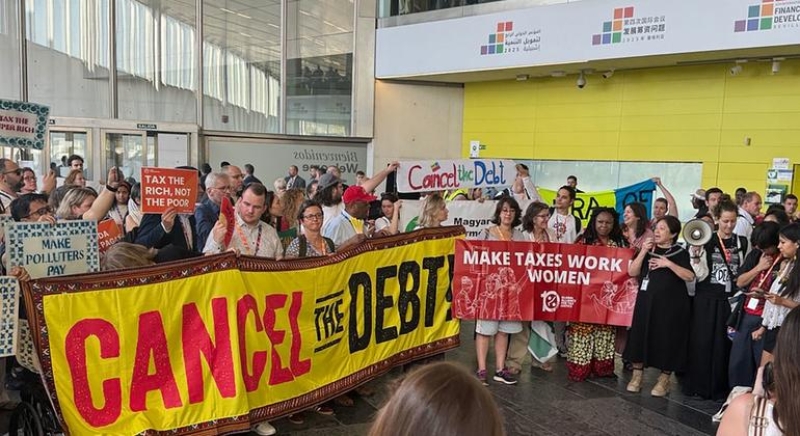- Puppet show enchants Children as Boi Mela comes alive on day 2 |
- DSCC Admin Salam’s drive to make South Dhaka a ‘clean city’ |
- 274 Taliban Dead, 55 Pakistan Troops Killed |
- Now 'open war' with Afghanistan after latest strikes |
- Dhaka's air quality fourth worst in world on Friday morning |
Sevilla Summit's Global Pledge Faces Test of Real Action

Civil society delegates voice their concerns during the final day of the 4th International Conference on Financing for Development in Sevilla, Spain.
Civil society organizations have welcomed the consensus reached at the landmark sustainable development conference concluding this Thursday in Seville, while cautioning that real progress will depend on sustained action.
Activists, many from the Global South, attending the talks in Spain are calling for greater leadership and commitment from wealthier nations to help address long-standing structural inequalities.
The 4th International Conference on Financing for Development (FFD4) carries strong symbolic weight, reflected in the agreed priorities of the Sevilla Commitment.
However, organizations warn that there is still a long way to go before promises translate into tangible results.
That is the message from Paula Sevilla, a representative of the International Institute for Environment and Development (IIED) – a London-based research center – who has worked for decades on sustainability and climate justice in Latin America, Africa, and Asia.
“This summit has come at a crucial time to try to restore faith in international cooperation, especially after the pandemic, which exposed a lack of global solidarity,” she stated.
One of IIED’s main goals in Seville has been to ensure that the announced financial commitments actually reach local communities at the forefront of the climate crisis.
To that end, the organization emphasizes the need to address issues such as external debt – which drains public budgets – and to support innovative mechanisms like blended finance to direct resources to those who need them most.
“We’re seeing countries spend more on debt payments than on healthcare or education, while inequalities are deepening,” the expert warned, speaking shortly after a respectful but forceful protest inside the conference center.
Housing solutions linked to sustainable development are notably absent from the summit’s final document.
“It’s regrettable that it’s not even mentioned, at a time when we are facing a global cost-of-living crisis – not only in the Global South but also here in Spain. Housing is a source of anguish and distrust among citizens, and it has been completely ignored,” Ms. Sevilla said.
Despite this, her organization is working to leverage the Sevilla outcome to find ways to channel funding into providing more affordable homes.
Commenting on the initiative led by Spain and Brazil to work towards fair taxation and push back against tax avoidance by the world’s richest – promoting more transparency and accountability – the IIED representative said it could be a useful path toward correcting structural inequalities.
“We need leadership from the Global North, where many of the world’s major tax-avoiding corporations are based. Without their commitment, we won’t move forward,” she stated.
She also criticized the absence of the United States from the summit – not only as a diplomatic setback but also as a worrying precedent following the dismantling of its international development agency, USAID.
“We’re talking about people counting their pills to figure out how many days of life they have left. This is dramatic,” she emphasized.
With just five years remaining to meet the Sustainable Development Goals, Ms. Sevilla warned that time is running out – and that the Sevilla Commitment will be meaningless without real change.
“We need political leadership, a will to cooperate, and a commitment to protect democratic space. In the end, it’s organized people who keep hope alive and hold leaders accountable,” Sevilla concluded.

